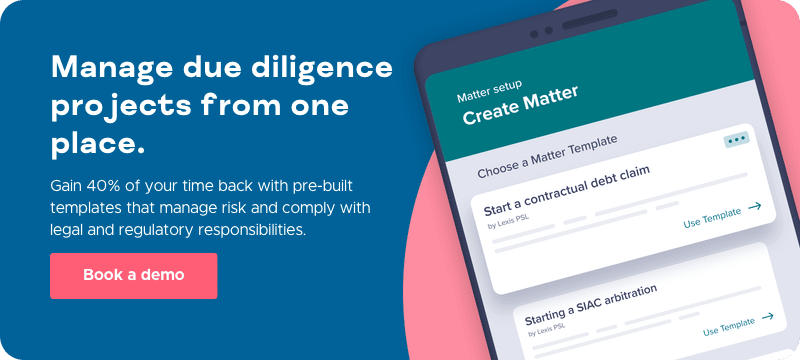Where Lupl Matters… Corporate Due Diligence

What is it?
Corporate Due Diligence (DD) takes place in the early stages of buying a company. It is led by the lawyers acting on behalf of the buyer of or investor in a company. The process involves an investigation into the target company by reviewing the legal, financial and commercial risks of the acquisition. It may involve the review of thousands of documents, which need to be sorted, searched, reviewed and coded.
Who are the key legal players?
Typically, a Senior Associate in the Corporate department of a law firm will manage the DD process. Specialist input will be required from 5-10 other practice groups at the firm, and possibly also external SMEs, so it requires a huge amount of coordination and project management.
For example:
- Employment team: may need to review management contracts to ensure the senior team won’t exit immediately after the sale.
- Commercial team: will want to review termination clauses of key customer contracts to guarantee the company’s revenue.
- Data Protection team: will want to review the company’s compliance with regulations such as GDPR.
- Real Estate: may need to review the terms of the company’s lease(s).
What is the key deliverable?
The output is a DD report for the buyer/investor client, which flags all the key legal risks relating to the target company. This report is used to assess the valuation of the company, identify any unknowns and flag any dealbreakers. The Corporate Senior Associate is often responsible for producing this report.

What problems exist with it today?
- Ever-changing landscape: as timelines and commercial terms shift, plans, budgets and timeframes need to be managed for the review – with little supporting tech.
- Multiple resources to manage: it can be tricky to manage several teams, each made up of multiple individuals with other deadlines and deliverables on their plate.
- Document management: each team is responsible for completing their specialist area of the DD report. It can be a challenge to manage version control, and ensure that specific tasks relating to areas of the document are being completed on time and by the right people.
- Progress tracking: tracking progress against key deadlines is often managed using individuals’ calendars, spreadsheets and email. There is little visibility of progress and therefore little accountability when there are delays.
- Communication: communication channels are often siloed within teams, rather than across them. When communication breaks down, deadlines slip and frustration increases.
How can Lupl help?
The legal tech stack that supports DD currently targets:
- document collection and storage (ie data rooms),
- the document review process (eg platforms such as Relativity, Kira), and
- transaction management and closing checklists (eg Litera Transact, Legatics).
However, the review process is a large-scale project management piece and there is little out there to support this side of things. That’s where Lupl can help:
Task Management and Pins:
- Centralized task management of all key dates and deadlines. This allows the Corporate Team to manage the progress and other teams to know what needs to happen and when.
- Pin applications and resources, including the data room link, so that less time is wasted trying to get access.
Matter Templates:
- Standardized processes with matter templates to save time and reduce risk.
Document Collaboration:
- Real time access to the latest draft of the DD report by all parties.
- Document editing, automatically syncing all changes back to the internal document management system, if connected.
- Version control, so everyone is working on the same version of the report.
- Linked tasks and documents, boosting productivity and visibility of progress.
Communication:
- Instant, accessible communication channel with the entire matter team, breaking down internal silos and boosting efficiency.
- Easy to manage expectations and changes as the requirements of the DD shift alongside the wider negotiations.
- Automatically generated matter email address, so that Lupl can be the central source of truth to all communications relating to the review.
- Everybody has visibility of who is doing what and how it’s going.
Lessons learned:
With each DD, lessons learned can be captured in the matter and used to update company matter templates to improve the process for next time.

More legal tech insights we think you'll love

Q2 2024 Product Update – New Features & Improvement
Lupl is the leading task and project management solution for...

How a team of trainee lawyers streamlined work handovers with Lupl
CMS trainees adopt Lupl's task management tools to enhance work...


